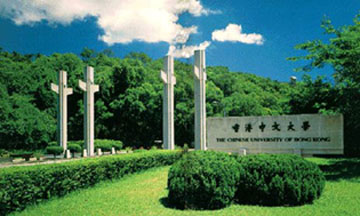 Three to four
Three to fourPreparation for addition of
one academic year underway
By Kathy Lo
Much controversy has been stirred up since the unprecedented joint press conference held by the eight tertiary institution chiefs on 5 November. They expressed preference for the 4-year curriculum in tertiary education.
The Chinese University of Hong Kong, which until the early 1990s adhered to a 4-year curriculum, exhibited firm support for the change.
Prof. Arthur Li Kwok-cheung, vice-chancellor of the Chinese University, said, "University education is not specialized education.
"We encourage students to be well rounded, to spend time studying a broad range of subjects and participating in extracurricular activities."
He finds it difficult to achieve these aims in a 3-year curriculum.
"The ideal goal of tertiary education can only be achieved by offering 4-year undergraduate programmes," Prof. Li said.
"The Chinese University adopted a 4-year curriculum when it (the University) was established. I believe the University is experienced enough to change without much special preparation."
However, he pointed out that the difficulties would come from different perspectives on education by the government and the tertiary institutions.
He said, "The government views education as an expenditure while the institutions regard it as investment.
"Hong Kong is spending only about 2.7 percent of its gross domestic product on education. It is too low compared to most Asian countries."
As for the impact of the 3-year curriculum adopted in 1994, Prof. Li said it is still early to form a negative judgment.
"But I think the current system does influence the self-development of students. "They have less time for understanding a wide range of subjects such as culture and society.
"They have generally become more self-centred. This may result in a narrow vision of our future leaders," said he.
Hong Kong University has been paving the way for the introduction of a 4-year curriculum.
A task force was set up last year to examine the change and work out a schedule.
Prof. Cheng Yiu Chung, vice-chancellor of Hong Kong University, said the focus would be on improving language proficiency, introducing general education and promotion of students' academic levels from matriculation to university standard.
He said, "No proposal will be submitted to the Hong Kong Government at this stage because of the University Grants Committee's insistence on a 3-year curriculum.
"The traffic light in the committee is red right now. We need a yellow one to move on.
"The suggestion is just a message delivered to arouse public concern. Preparations will be taken once the yellow signal is on."
Likewise, the City University of Hong Kong has started taking initiatives for the change.
 |
| Prof. Lam says the handover provides a chance for change. |
Prof. Lam said, "The credit unit system is flexible. It allows students to choose and study a wide range of subjects.
"The new system will offer a greater degree of flexibility, which facilitates the implementation of 4-year curriculum.
Concerning the economic aspect, the University will need more funding if the same number of students are enrolled in the University, he said.
"It is estimated that the Hong Kong population will expand to about 8 million by 2001.
"There will be a greater demand for not only secondary education, but also tertiary education," he added.
In order to switch to a 4-year curriculum, there is a common view that secondary education has to make changes so as to complement tertiary education's reform. Dr. Leslie Lo Nai-kwai, an educationalist and dean of the Faculty of Education at The Chinese University of Hong Kong, said that a 4-year curriculum would meet Hong Kong's aim to be an international city.
He said graduates need a broad vision to cope with the development of Hong Kong. "They should possess excellent command of Chinese and English.
"Moreover, they should be able to find out relevant information needed within a short time.
"Students should also have the ability to synthesize, to sort out the implications and meanings behind a large group of data," he said.
"It is a pity that students are in a hurry to complete their degree courses instead of fully utilizing the facilities on campus."
He suggested that Hong Kong's 9-year free compulsory education should be extended to 12 years or Form 6 as part of secondary education reform.
"Research shows that the proportion of Form 4 students in grammar schools is about 90 percent of the relevant age group.
"This implies that it has become a social trend to pursue further education after 9-year free compulsory education.
"With reference to Hong Kong's economy, the government should consider investing in upper secondary education," Dr. Lo said.
He added that this would ease examination pressure on secondary students in the current secondary education system — five secondary school and two matriculation years.

January 1997
Return to contents
